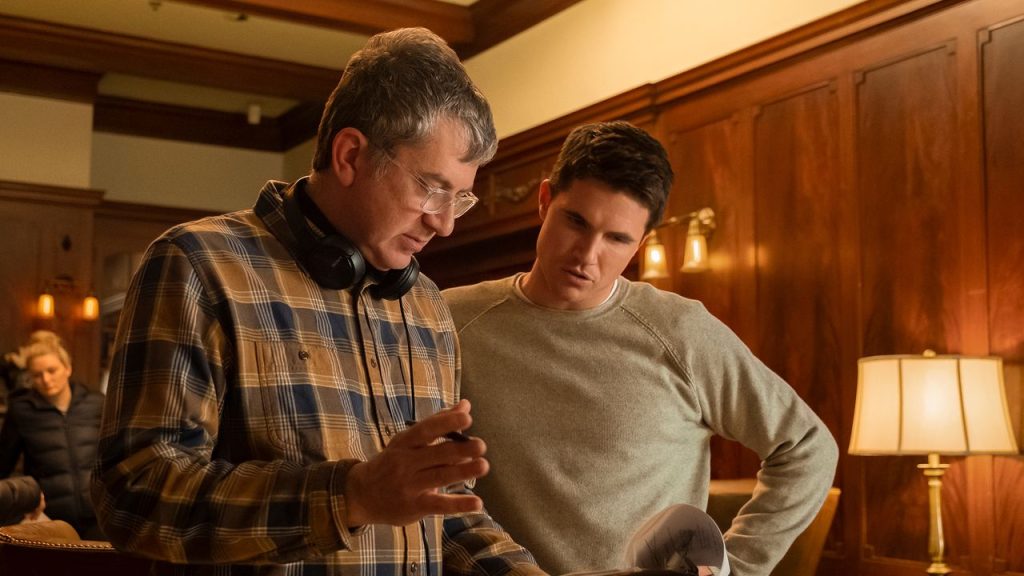Greg Daniels is an old-fashioned kind of futurist. The TV writer and veteran showrunner is known for the American version of The Office, as well as Parks and Recreation, King of the Hill, and Space Force—all series about people struggling to keep their footing while being tossed about by changing times. He also just wrapped up another show, Prime Video’s Upload, which is about what it means to be alive when those who can afford it are able to digitally preserve their own consciousness. At the same time, Daniels is launching another comedy: Peacock’s The Paper, about a team of idealistic underdogs trying to revive the decaying fortunes of a legacy newspaper in Toledo, Ohio.
“I kind of think it’s the same issue, because the tech is what’s killing the newspapers,” Daniels tells Vanity Fair. “If it weren’t for eBay and Google and social media, there would still be much more economic life in the newspapers.” Those conglomerates decimated print advertising. Now journalists are facing another existential crisis: the possibility of being completely replaced by large language models, like ChatGPT, that can generate content on the cheap. “The changes in tech are what’s hollowing out newspapers more than anything else,” Daniels says.
The Paper, which he co-created with Michael Koman (Nathan for You), forces its characters to double down on their ingenuity. They are out in the wild, battered by economic and social forces far beyond their control—but they are hunting and gathering to survive.
Domhnall Gleeson stars as Ned Sampson, the energized new editor of the Toledo Truth Teller—the neglected and largely forgotten part of a broader paper-product company. The Paper is a direct spin-off from The Office, with actor Oscar Nuñez reprising his role as Oscar Martinez from the Dunder Mifflin days. Chelsea Frei costars as a reporter who’s the only other competent member of the staff, while Sabrina Impacciatore (best known as the Italian hotel manager from The White Lotus season two) is a backstabbing managing editor with little in the way of journalistic scruples.
Those on the team fight to do right by their community while resisting efforts to further erode the newspaper’s capabilities. Daniels says the show was inspired by countless publications across the country that are clinging to life after seeing their revenue and readership plummet due to mismanagement.
“Zombie is the term. I’ve heard them called ghost newspapers,” he says. “It’s a thing where a conglomerate or private-equity company or something will buy the newspaper. They’ll fire the reporters. They keep the people selling the ads, and the delivery system. They cut costs to the bone. It looks like a newspaper, but it doesn’t cover…anything.”
Both Upload and The Paper are in a constant state of gaming out best- and worst-case scenarios. “I think people have an instinct that AI could completely screw us over somehow, and it’s being rushed into. And we’re kind of dancing around that comedically in Upload,” Daniels says. “The Paper is a similar situation, I think, where people are like, Something could be better about journalism.”
In Upload, changes in tech go a step further—they’re hollowing out our souls. Once its characters are hooked on the state-of-the-art software that simulates existence, they have no choice but to keep paying for it. “The big thing in Upload season four is the company wants to monetize all this AI,” Daniels says.
It all sounds bleak, but there’s typically a buried optimism in Daniels’s shows as well. Upload and The Paper both follow people trying to move forward into their brave new worlds without losing themselves.
Most interviews take place over Zoom these days, but Daniels agrees to meet in an analog way: face to face. He chooses Esau’s Cafe, a tiny seaside diner in Carpinteria, California, because he likes its blueberry muffins—even though he doesn’t order one.
In addition to having finished Upload and starting The Paper, he’s also executive-producing Hulu’s new King of the Hill reboot, which picks up 15 years after the long-running animated series ended its run in 2010. Mike Judge returns as the stoic voice of Texas propane enthusiast Hank; Kathy Najimy is still indefatigable Peggy; and Pamela Adlon is the grown-up Bobby, now an Asian-fusion chef. The original series, cocreated by Judge and Daniels, derived much of its humor from its repressed Middle Americans clashing with volatile cultural changes—and that part, at least, hasn’t changed.



